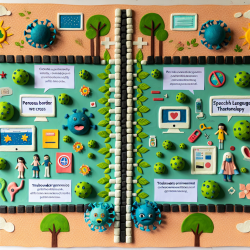Embracing Interdisciplinary Insights for Language Development
In the realm of speech-language pathology, the pursuit of knowledge is a continuous journey. As practitioners, our commitment to improving outcomes for children is fueled by research and data-driven insights. The Editorial to the South African Journal of Communication Disorders special issue offers a treasure trove of findings that can significantly enhance our practice, particularly in the context of multilingualism and language acquisition.
The Power of Interdisciplinary Research
The special issue highlights the importance of interdisciplinary collaboration in understanding language development. It brings together linguists, psychologists, and speech-language therapists to address the unique challenges faced in multilingual South Africa. This approach is not only applicable to South Africa but also offers valuable insights for practitioners worldwide dealing with multilingual populations.
Key Takeaways for Practitioners
Here are some pivotal insights from the research that practitioners can integrate into their work:
- Understanding Language Acquisition: The research underscores the importance of understanding the cognitive and linguistic processes in different languages. This is crucial for developing effective assessment and intervention strategies.
- Multilingual Exposure: Studies show that early exposure to multiple languages does not hinder lexical development. Instead, it can enhance cognitive flexibility and linguistic competence, supporting the case for encouraging multilingual environments.
- Contextual Influences: Socio-economic status and language of instruction play significant roles in language development. Practitioners should consider these factors when designing interventions and assessments.
- Innovative Assessment Tools: The development of culturally and linguistically appropriate assessment tools, such as the Northern Sotho non-word repetition task, is crucial. These tools provide more accurate diagnostics and can be adapted for other languages.
Encouraging Further Research
While the findings from this special issue are groundbreaking, they also highlight the need for ongoing research. Practitioners are encouraged to contribute to this growing body of knowledge by conducting studies that explore language acquisition in diverse linguistic contexts. Collaboration with researchers across disciplines can lead to innovative solutions and improved outcomes for children.
Conclusion
As practitioners dedicated to creating great outcomes for children, it is imperative that we embrace interdisciplinary insights and continue to push the boundaries of our understanding. By integrating these findings into our practice, we can enhance our ability to support multilingual children in achieving their full potential.
To read the original research paper, please follow this link: Editorial to the South African Journal of Communication Disorders special issue.










